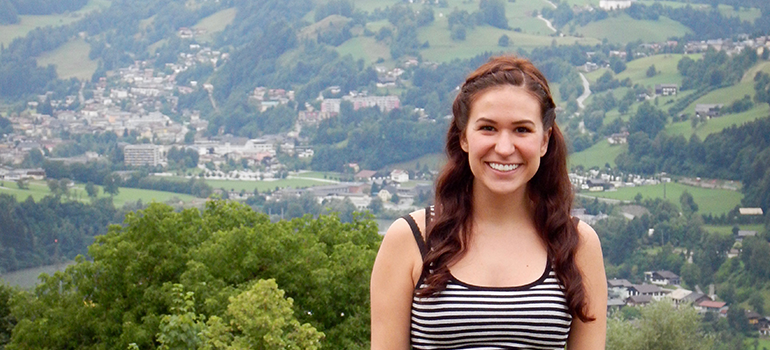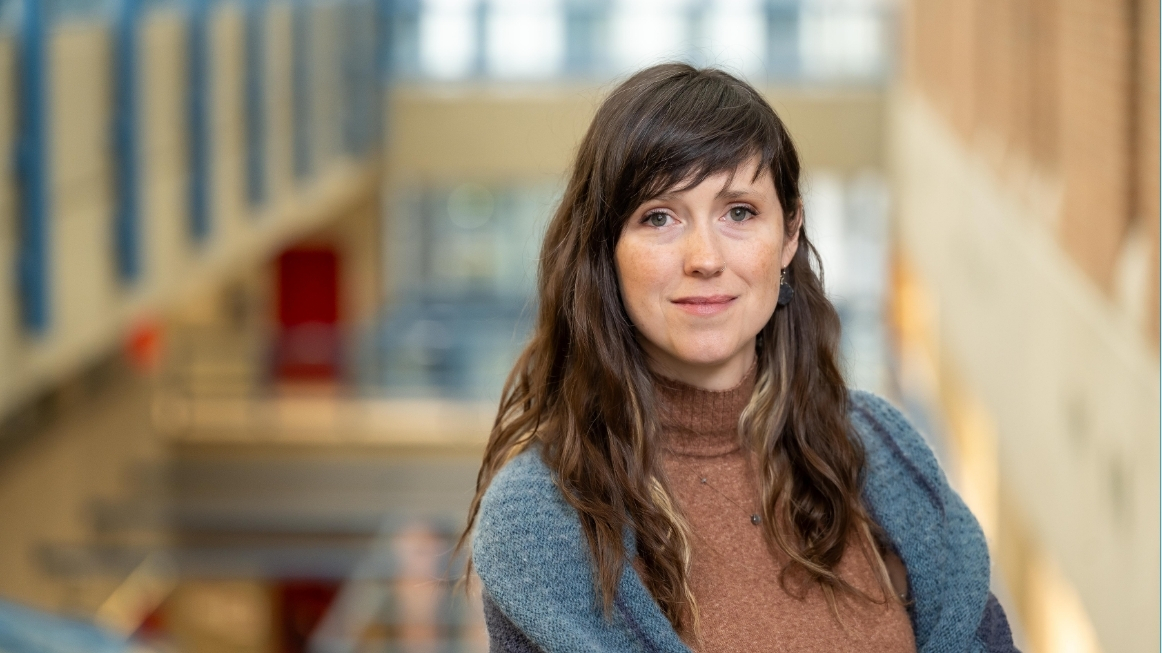

Robin Richardson is not your typical psychology student. Not only is Robin a 4th year Honours student, she’s a budding researcher and academic in the Department of Psychology at UBC. She is currently studying pharmacological treatments for postpartum depression in Dr. Liisa Galea’s lab, as well as executive functions and suicidal behaviour in Dr. David Klonsky’s lab. Robin is also a group leader in the department’s Student Engagement Program and President of UBC’s Psi Chi Chapter. In December 2015, she was awarded the Dean of Arts Scholarship and the Brissenden Scholarship in Humanities from UBC.
Now, this active and engaged student leader adds a new accomplishment to her already outstanding list of achievements. Robin was recently awarded UBC’s 2014/15 Premier Undergraduate and Wesbrook Scholarships. These scholarships are the University’s most prestigious designations awarded to senior students. The scholarships are highly competitive and she received them due to her “exceptional academic record combined with her extraordinary leadership abilities.”
We sit down with Robin to learn more about her experience as an Honours student, on finding her passion, and what drives her involvement in student activities.
First of all, why did you choose psychology?
I was a really cool kid and spent a lot of time reading books about science, and I was always really interested in trying to understand what drives human behaviour. When my mom told me that there was an entire academic field for that, called “psychology”, I was pretty much sold on psych as a major.
Do you have any advice for students considering the Honours program in psychology?
The Honours program is really special in that it’s an invaluable opportunity to take control of your own education. For those that don’t know, the Honours program involves working in a different psych lab each year and conducting a research project. Then at the end of the year, you write a thesis paper and present your research at a conference. The UBC Psychology Department has over 40 labs, so this is a great chance to find your passion and conduct research that you’re really fascinated by! Additionally, the research you do in the honours program can potentially influence your career direction, so try to find something that you’re really interested in.
Is there a single most important moment that has stood out for you during your time as a psychology student?
I remember being in PSYC 102 with Dr. David Klonsky and he was telling us about his profession. I guess I had never even realized that being a psychologist as a career was a thing, but as soon as he explained it I kind of went “Oh. This I exactly what I’m supposed to be doing with my life.” And everything sort of just clicked for me in that moment!
What is your favourite class, and why?
Oh gosh. Can I pick a few? PSYC 350 (Psych of Sexuality) with Jason Winters was so much fun, and the course material was really interesting. I also really loved PSYC 312 (History of Psychology) with Andrea Perrino because she’s such an engaging lecturer and I always really looked forward to going to class. Finally, I really enjoyed PSYC 301 (Brain Dysfunction and Recovery) with Mike Souza because the course material aligns really closely with what I’d like to research following graduation.
How has your involvement and leadership in the Student Engagement Program and the Psi Chi expanded your experience as a student?
I had participated in the Student Engagement Program as a second-year student, when it was in its pilot year, and the program was really instrumental in getting me acquainted with the department. Although I was already involved in research at that point, I had no idea that there were so many departmental events offered! Now as a Student Engagement Leader, it’s so much fun to be able to share my passion for psychology with the students in my group. It’s also really rewarding to get to help them with their research papers and answer their questions about psychology, because it kind of makes me realize how far I’ve come in my four years here.
I got involved with UBC Psi Chi in 2014, first as a general member and then as the Vice President. Being the VP was something that I was really uncertain about at first, because I wasn’t very confident in my leadership abilities. Now, I’m the President of Psi Chi, and I can assuredly say that my leadership abilities have improved a ton! I no longer feel terrified at the thought of being in charge; in fact, now I actively seek out projects to start, and I get to lead a team of super cool execs that help me turn all my crazy ideas into concrete endeavours. J
Which academic and professional achievements are you most proud of?
In early 2015 my friend Cameron and I applied to run our own student-directed seminar, and we were accepted! Now this semester we get together every Tuesday and Thursday from 3:30-5 to discuss executive functions with 7 other students. I am so proud of the course we put together – we put so much work into designing a course syllabus, choosing over 30 articles to read, thinking of fun projects, and developing grading rubrics. Now that our seminar is running, we are having a blast watching all our hard work pay off!
What advice do you have for students on how to carve their own academic path?
I think it’s really important to try to get involved with your department in whatever way you can. For me, that was volunteering in a few different research labs. For other people, that might mean joining a club, starting a new departmental initiative, or even just attending departmental events. Being involved can help you figure out what you want to do with your life – you might realize you really love what you’re doing and want to pursue it further, or you might realize you don’t like what you’re doing at all and you’d rather try something else! Either way, you learn something.
What do you do when you’re not studying or being involved as a student leader?
Mostly research! I spend about 20 hours a week in my two labs. But when I’m not in the lab, you can find me either in the dance studio or in bed watching Netflix.
What are your plans after graduating?
Hopefully grad school! I’ve applied for the clinical neuropsychology program at four schools in Canada. It’s a seven-year program that will result in me getting a Masters degree and a PhD. I’m really interested in researching the interactions between depression and executive functions following concussion, and ultimately I’m looking to have a career where I can work with individuals who have sustained brain injuries.
-Bonnie Vockeroth
Recent News
Achievement
Congratulations to our Fall 2025 MA and PhD Graduates
November 24, 2025


Achievement, Students
UBC Psychology student awarded APA SUPER Fellowship for equity-focused research
November 12, 2025


Achievement, Announcement
Dr. Jessica Flake receives the Anne Anastasi Distinguished Early Career Contributions Award
November 6, 2025

